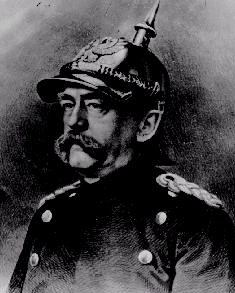 |
| Home Intro Technical History Crew Models Gallery Kriegsmarine Archives More Forum Español |

|
The battleship Bismarck was named in honour of Otto Fürst von Bismarck, the architect of German unification and the arbiter of European politics during the second half of the 19th century. Bismarck, also known as the "Iron Chancellor", was the founder and first chancellor of the German Empire, and through his diplomatic skills, he managed to maintain the peace in Europe for a generation.
Early Life and Career.
Otto von Bismarck was born on 1 April 1815 at Schönhausen in Brandenburg, Prussia. His father, Ferdinand von Bismarck-Schönhausen, was of the old Prussian nobility. His mother, Wilhelmine Mencken, from the upper bourgeoisie. He studied law at the University of Göttingen in Hanover, and obtained his degree in 1837. In 1847, he married Johanna von Puttkammer. During the revolutions of 1848, Bismarck favored suppression of revolt and opposed any concessions to the liberals, staying loyal to the monarchy. In 1849, he was elected to the Prussian Chamber of Deputies (the lower chamber of the Prussian Diet). In 1851, Frederick William IV appointed Bismarck as the Prussian representative to the federal Diet in Frankfurt. In 1859, Bismarck was sent to Russia as Prussian ambassador to St. Petersburg, and in May 1862, he moved to Paris as ambassador to the court of Napoleon III. Soon after he returned to Berlin, and on 22 September 1862, Bismarck became minister president and foreign minister for the Prussian king William I (Wilhelm I).
German Unification.
After a series of victorious wars against Denmark over Schleswig-holstein in 1864, and against Austria in 1866, the North German Confederation (Norddeustcher Bund) was formed in 1867 under Prussian control. Then in 1870, following the victorious conclusion of the Franco-Prussian war, Germany succeeded in obtaining Alsace and Lorraine. The German Empire was proclaimed at Versailles on 18 January 1871 by King William I as Emperor, and Bismarck was elevated to prince (Fürst) and imperial chancellor (Reichskanzler).
Imperial Chancellor.
As German chancellor, Bismarck directed his foreign policy at maintaining and strengthening the power of the German Empire. In order to prevent a war of revenge, Bismarck decided now to isolate France diplomatically. In 1873, he formed the Three Emperors' League (Dreikaiserbund) with Russia and Austria-Hungary. But rivalry in the Balkans provoked the Russo-Turkish War of 1877, and Bismarck had to mediate at the Congress of Berlin in 1878, successfully maintaining the peace. Increasing Russian hostility brought about the the Dual Alliance with Austria (1879), and then the Triple Alliance when Italy joined in 1882. Bismarck, however, sought to tie Russia to this alliance by reviving the Three Emperors' League (1881-87) through the Reinsurance Treaty (1887-90). He also gained British cooperation.
Domestically, Bismarck extended the powers of the imperial government, adopted laissez-faire economic policies, fought the political power of the Roman Catholic church in the Kulturkampf, and pioneered social welfare measures.
After the death of William I in 1888, differences between William II, provoked Bismarck's resignation on 18 March 1890. He devoted his last days writing his memoirs. Bismarck died in Friedrichsruh on 30 July 1898 at the age of 83.

| Home Guestbook Quiz Glossary Help us Weights & Measures Video Credits Links Contact |
